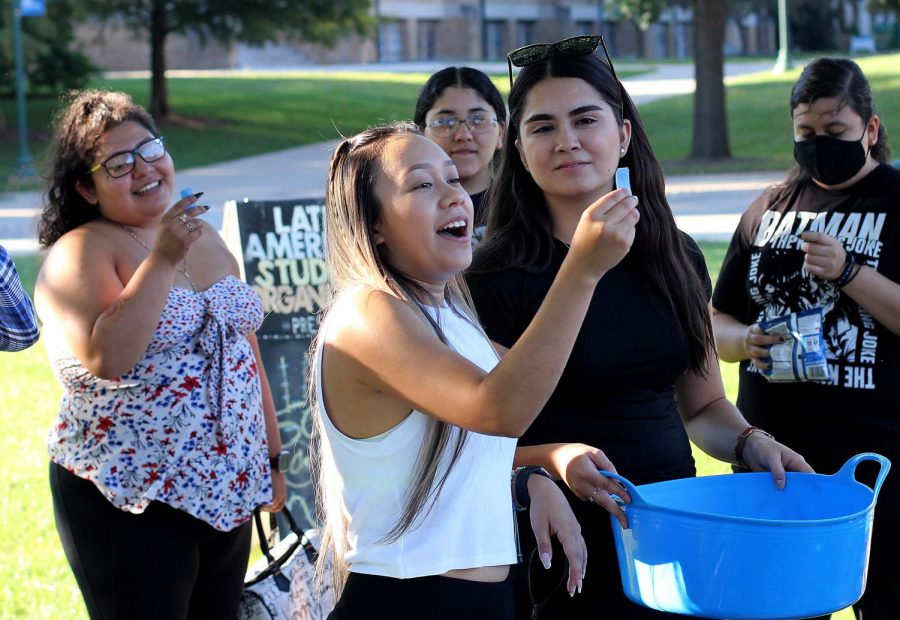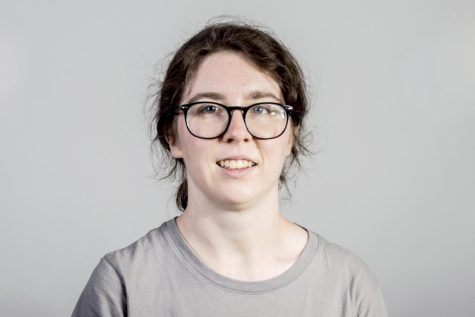Minority students say Eastern needs to step up
Daniela Munoz, a senior fashion merchandising and design major, pulls a raffle ticket out of a bin during the Latinx social event sponsored by Eastern’s Latin American Student Organization on Sept. 8 in the Library Quad.
September 14, 2022
Minority students discuss Eastern’s lack of acknowledgment for student minorities’ mental health.
Daniela Munoz, a senior fashion merchandising and design major, says that she likes to give herself some offline time during the weekend.
Munoz is president of the Latin American Student Organization, LASO, a part of the Merchandising and Apparel Design Association and has a marketing minor, which she says keeps her pretty busy.
“I’m usually very busy during the week so to cope with that I make sure to take some offline time to myself during the weekend,” Munoz said. “I’m a big mental health advocate, so I also believe in implementing small healthy habits around my busy schedule like doing my bed each morning and not using my phone for the first hour that I’m awake. This is to not make me feel so messy or overwhelmed with my routine. Also, making sure my agenda/calendar is always up to date is crucial.”
Kenneth Ingle, a junior psychology major, says they chose to live in Ford Hall when they came to campus because the Doug DiBianco Living Learning Community did not exist.
“It actually wasn’t implemented when I first got here,” Ingle said. “So I chose Ford before then because the Triad was like the queer safe option at the time. And then I did not choose the floor just because it was very new, and I didn’t know how it would be monitored. Like, if it would go well. I decided to stay in Ford because it was what I knew.”
Munoz says that at primarily white institutions like Eastern, there are many events that focus on mental health, but not of minorities who only get a month’s worth of events.
“Since EIU is a primarily white institution, it’s easy to assume that minorities need more health because of issues like culture shock and first-gen issues,” Munoz said. “However, in general, I don’t believe Eastern has done everything possible to acknowledge the mental health issues for the minority community on campus. For events, Eastern has hosted and put on many events for students to understand mental health but only dedicate one month opportunities like Latino Heritage Month for the minorities. This is the one time out of the whole school year where EIU claims the EIU diversity experience, but it’s not enough.”
Ingle agrees, saying while there are resources available, other students pointed it out to them rather than faculty.
“I think in general, there’s been a shift in focus to making wellness more accessible over time, but I think they really had to be pestered to do that, really mass requested by people,” Ingle said. “To minorities, especially like in my experience living here, it’s more so the university doesn’t really do anything, but the RAs [residential assistants] really look out for people and will pass it along. But I didn’t know about counseling until my second year here. I didn’t know about the various things in McAfee like disability services, and the closet for queer folks like getting actual like stuff in that. They really didn’t promote accessibility or mental health services I don’t think.”
Munoz hopes that the experiences of minority students will stop being generalized. Munoz said that campus can become diverse if Eastern takes action to better the community.
“I believe that Eastern can get better involved in the POV of minority students, instead of generalizing the issue for the whole minority community,” Munoz said. “This means that students should be more comfortable talking about these problems and for Eastern to make them feel included in the possible ways of improvement. It’s easy for Eastern to gain a diverse community on campus, but they need to take action on how to keep and better help this community on campus.”
Katja Benz can be reached at 581-2812 or at kkbenz@eiu.edu.





































































